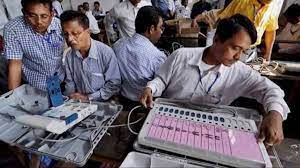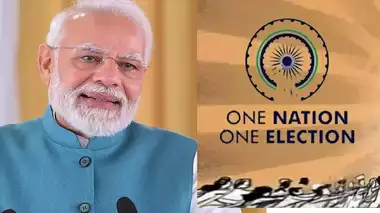By – Prakarsh Kastwar
The much-anticipated “One Nation, One Election” Bill will not be presented in the Lok Sabha on Monday as initially planned. The decision to introduce the bill has been postponed by the government, according to the revised agenda released by the Lok Sabha Secretariat. The winter session of Parliament is set to conclude on December 20, and discussions were expected to take place on the bill, but the government has decided to delay its presentation. Reports indicate that the government will prioritize completing financial matters first, including the passing of supplementary grants in the House, before moving forward with the introduction of the bill.
The revised agenda issued by the Lok Sabha Secretariat confirms that the “One Nation, One Election” Bill will not be on the agenda for Monday. Instead, the government is expected to present the bill later this week, after the completion of financial procedures in Parliament.

Two Key Bills Scheduled for Presentation
Two other important bills, namely the Constitution (129th Amendment) Bill and the Union Territory Laws (Amendment) Bill, were listed for presentation in the Lok Sabha on Monday. However, the revised schedule confirms that these bills will not be discussed on the specified date. Instead, they are expected to be introduced later this week, following the passage of supplementary demands for grants by the House.

Impact on the “One Nation, One Election” Bill
The “One Nation, One Election” Bill was anticipated to be presented on Monday, with a significant focus on streamlining the election process and conducting simultaneous elections for both the Lok Sabha and state assemblies. However, the government has opted to delay its introduction to prioritize financial matters, including budget-related discussions.
The revised agenda leaves open the possibility of presenting the bill in the coming days, with reports indicating that the government plans to complete financial procedures first before revisiting the legislation. The delay in presenting the bill may push its introduction to the latter half of the winter session.

A Glimpse of the Bill’s Provisions
The Constitution (129th Amendment) Bill, 2024 and the Union Territory Laws (Amendment) Bill, 2024 were both approved by the Cabinet earlier this week. The bills were subsequently distributed to MPs on Friday evening. The Constitution Amendment Bill aims to introduce a provision for conducting simultaneous elections for the Lok Sabha and state assemblies. It proposes adding a new Article 82(A) to the Constitution, which would set a date for conducting elections to both the Lok Sabha and state legislatures at the same time.
According to the bill, after the Lok Sabha elections, the President will announce a date for conducting elections to the state legislatures. This date would mark the end of the term of the elected state assemblies, aligning their term with the Lok Sabha’s term and paving the way for simultaneous elections.
The legislation has sparked debates about the feasibility of holding such elections, with experts pointing out that this move could potentially delay the process until after the 2029 general elections. Consequently, it is highly unlikely that simultaneous elections will take place before 2034.
Recommendations from the Kovind Committee
The Constitution (129th Amendment) Bill is based on the recommendations of the high-level committee chaired by former President Ram Nath Kovind. The committee’s report, which examined the logistical and constitutional challenges of holding simultaneous elections, was instrumental in shaping the provisions of the bill. Among the key proposals in the bill is the introduction of Article 82(A), which seeks to conduct simultaneous elections for the Lok Sabha and all state assemblies.
The bill also proposes amendments to several existing articles of the Constitution, including Article 83 (Duration of Houses of Parliament), Article 172 (Duration of State Assemblies), and Article 327 (Power of Parliament to make laws on elections to state assemblies). The aim is to align the election schedules of the Lok Sabha and state assemblies to ensure a synchronized electoral process.
Impact of Mid-Term Elections
In the event of the dissolution of the Lok Sabha or any state or union territory assembly before the completion of its full term, the bill proposes that mid-term elections be held only for the dissolved assembly. This would mean that a mid-term election would only cover the remaining tenure of the assembly that was dissolved, and the rest of the assemblies would continue their term until the next scheduled elections.
Delayed Timeline for Simultaneous Elections
Given the current electoral cycle and the upcoming general elections in 2024, it is likely that the government will set a date for simultaneous elections after the 2029 elections. This means that simultaneous elections could be a reality only after 2034, with little to no chance of them occurring before then.
As the winter session progresses, political parties, legal experts, and constitutional scholars will continue to analyze the potential implications of this landmark legislation. The government’s delay in introducing the bill has only fueled further discussions about the feasibility and impact of holding simultaneous elections in India.


Идеальный выбор для разделения материалов в вашем производстве, с максимальной точностью сортировки.
Установка грохот мобильная barabaniy-grohot.moscow .